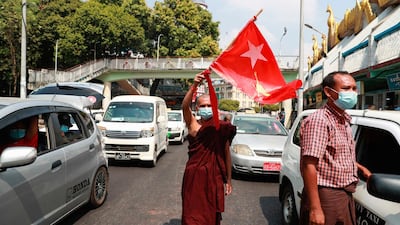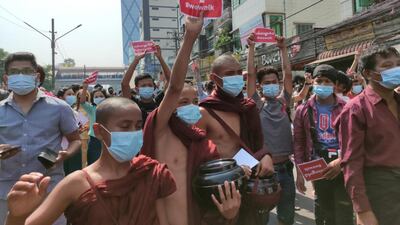Myanmar’s ongoing protests became increasingly chaotic on Tuesday, as demonstrations continued in the capital Yangon. Tens of thousands of protesters defied a ban on public gatherings this morning, just hours after the new regime imposed martial law. But reports have also surfaced from Pathein, the capital city of Ayeyarwady, that local security forces are sympathising with the protesters. Video footage posted to twitter, which could not immediately be verified, appeared to show police joining protesters by tearing down road barriers.
Demonstrators in the area and people posting on social media said soldiers blocked all main roads in the district of Hledan, near Yangon University.
The troops forced some protesters to retreat, with as many as 10 army vehicles full of soldiers heading into the area along with at least six water cannons, Bloomberg reported.
The move put the youth-led anti-coup movement on a collision course with the military, which has a history of deadly crackdowns on dissent.
Opponents of the coup vowed to continue non-violent action despite the ban on big gatherings, night curfews and road closures.
The demonstrations are Myanmar’s biggest in a decade.
The coup on February 1 and the detention of elected civilian leader Aung San Suu Kyi prompted days of protests across the Southeast Asian country.
A civil disobedience movement in country of 53 million is growing, affecting hospitals, schools and government offices.
Police used a water cannon against protesters in the capital Naypyidaw for a second day running on Tuesday, video from the scene showed.
On Monday, in his first address since seizing power, junta leader Min Aung Hlaing drew scorn by promising to eventually hold a new election.
He repeated unproven accusations of fraud in last November’s election, which Ms Suu Kyi’s National League for Democracy won in a landslide.
“We will continue to fight,” youth activist Maung Saungkha said, calling for the release of political prisoners and the “complete collapse of dictatorship”.
Activists are also seeking the abolition of the constitution that gave the army a veto in parliament and for federalism in ethnically divided Myanmar.
After tens of thousands of people took to the streets across the country, local orders banning gatherings of more than four people were imposed.
The US Embassy said it had received reports of a curfew in the two biggest cities, Yangon and Mandalay, from 8pm to 4am local time.
Bridges connecting central Yangon to populous districts outside were shut on Tuesday, residents said.
There was no further comment from authorities on the measures to stop protesters.
An older generation of activists formed during bloodily suppressed protests in 1988 called for the strike action by government workers to continue for another three weeks.
The civil disobedience movement, led by hospital workers, has resulted in a plunge in coronavirus tests, official testing figures showed.
Myanmar has one of the worst coronavirus outbreaks in Southeast Asia with 31,177 deaths from more than 141,000 cases.
Min Aung Hlaing said the junta would form a “true and disciplined democracy,” different to previous eras of military rule which left Myanmar in isolation and poverty.
“We will have a multiparty election and we will hand the power to the one who wins in that election, according to the rules of democracy,” he said on Monday.
Min Aung Hlaing gave no time frame but the junta said a state of emergency will last one year.
The electoral commission had dismissed his accusations of fraud in last year’s ballot.
Western governments have widely condemned the coup, although there has been little concrete action to put pressure on the generals.
A prominent Singapore businessman said he would withdraw his investment in a Myanmar tobacco company linked to the military, joining Japanese drinks giant Kirin Holdings, which scrapped its beer alliance in the country last week.
The UN Security Council has called for the release of Ms Suu Kyi and other detainees. The UN Human Rights Council will hold a special session on Friday to discuss the crisis at the behest of Britain and the EU.
The administration of US President Joe Biden is considering targeted sanctions and said on Monday it was moving quickly to form its response.
In a letter on Monday, a senior member of Ms Suu Kyi’s party asked UN Secretary General Antonio Guterres to “use all available means ... to ensure a swift reversal of the coup”.
Ms Suu Kyi, 75, won the Nobel Peace Prize in 1991 for campaigning for democracy and spent nearly 15 years under house arrest as she struggled to end almost half a century of army rule.
She has been kept incommunicado since her arrest. She faces charges of illegally importing six walkie-talkies and will be detained by police until February 15.
Her lawyer said he has not been allowed to see her. The US State Department said it tried to reach her, but access was denied.
Ms Suu Kyi remains hugely popular at home despite damage to her reputation internationally over her muted response to the plight of the Muslim Rohingya minority.




















